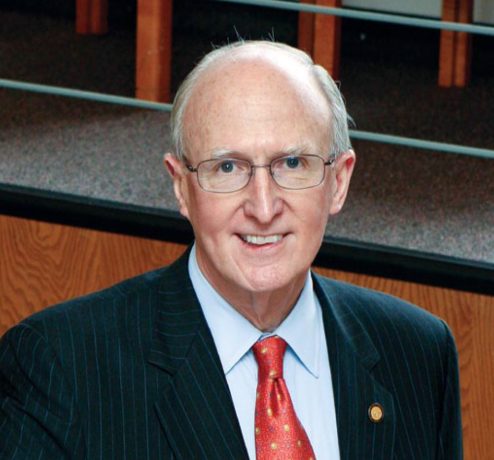By Dr. Robert A. Scott
Major challenges facing our country and the world include climate change, chronic diseases such as diabetes resulting from obesity, threats of new pandemics, and unequal access to good nutrition and education, among others.
When we think of such challenges, we also think of who will respond and who will lead the way to solutions. Who will help solve these universal challenges? The agents include governments, businesses, nonprofit or community-based organizations and each of us. Yet each has a different time horizon for decision-making.
Take contemporary corporations.
Except for privately held or family companies, corporations generally are governed by the requirements of quarterly reports. They must report their condition every three months. While quarterly reports have some advantages, they also have substantial disadvantages when it comes to long-term planning and investments in the business of the future.
The quarterly reports include information about the financial state of the company, financial goals and challenges. They allow companies to compare their results against the past and competitors, help set and monitor the achievement of goals, inform stakeholders and shareholders of current conditions and build trust with potential investors.
There are disadvantages to quarterly reports, however. Three months is not a long time in a dynamic market. Small changes can cause investors to lose confidence and call for changes in management, especially in businesses with fluctuating sales. They also take a lot of time to create, time that might be better spent in managing the business and improving the quality of products and services.
A focus on today’s profits in the short term can crowd out thinking about the future of the business and new market opportunities, such as alternatives to fossil fuels and medicines for chronic diseases, as well as create incentives to manipulate the figures so the reports look better.
Compensation plans can lead executives to put near-term profits over long-term success for all stakeholders.
But what about government?
The government, or public sector, is not always better. With two, four, and six-year election cycles, as well as the need under our system to raise enormous amounts of money even for local races, the incentive for elected officials is to focus on the immediate instead of the important.
The need for funds can lead to the equivalent of insider trading in business, giving advantage to some instead of serving all.
We see this in so many ways. The role of government is to serve society as a whole, not special interests. It is empowered to create public policies as if people matter. Yet the system of election financing leads politicians to be beholden to those who have helped them win elections.
I saw this firsthand in the money that flowed to members of Congress who created the laws and regulations that permitted predatory for-profits colleges to reap enormous sums of federal money and short-change students, all while claiming that the private enterprise system was more efficient and effective than traditional colleges.
We saw it in the congressional action that denied the ability of government to negotiate drug prices as part of the Affordable Care Act. This disadvantaged U.S. citizens who had to pay higher drug prices than in most every other country.
We see it in federal subsidies for corn production that led to high fructose corn syrup, a major contributor to America’s obesity problem. Over 40% of U.S. adults are obese, and obesity and its consequences account for nearly 25% of the nation’s health care bill.
Does the time horizon for the nonprofit sector serve society better?
While individual community-based organizations certainly face challenges of funding that require short-term thinking and action, the sector as a whole includes institutions and organizations that take a long-term view. These include universities and foundations.
The late scholar David Riesman said that the role of the university board of trustees was to save the institution of the future from the actions of the present. While this goal is often honored in the breach, it still obtains and is monitored by regional and programmatic accreditations.
In this environment, and with federal support for science, universities can encourage and support curiosity-driven research into even intractable problems of disease and technology.
The other nonprofit institution with a long-term view is the charitable foundation. Foundations such as the Gates, Ford, and Schmidt Futures can give priority to global challenges such as chronic disease and climate change.
They have the resources and time horizon to address issues that corporations and governments shy from because of their shorter-term cycles. Andrew Carnegie did the same for literacy by supporting local libraries. Ideally, the results of foundation effort will encourage corporations and governments to follow their lead and take necessary actions.
While foundations can spur needed and desired action, I find it troubling that major issues facing our nation rely upon the generosity of wealthy individuals who alone decide on their priorities for funding. After all, their wealth is the result of public tax policy that favors the accumulation of wealth over the needs of society.
What about us?
What can we do as individuals? We can encourage candidates to reform our election financing laws, advocate for corporate Environment, Social, and Governance goals through our pensions and individual investments, and be active in community discussions about priorities.
We as individuals and members of groups can advocate for the long-term view, for public policies that address seemingly intractable problems that, if unchecked, will undermine our children’s future, the nation and the world.
Dr. Robert A. Scott is resident Emeritus of Adelphi University, author, “How University Boards Work,” Johns Hopkins University Press, Eric Hoffer Book Prize Awardee

